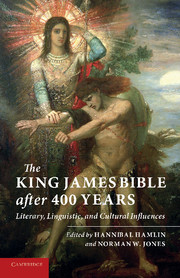Book contents
- Frontmatter
- Contents
- List of Figures
- List of Illustrations
- List of Contributors
- Acknowledgments
- Introduction
- Part I The Language of the King James Bible
- Part II The History of the King James Bible
- Part III Literature and the King James Bible
- 8 Milton, anxiety, and the King James Bible
- 9 Bunyan’s biblical progresses
- 10 Romantic transformations of the King James Bible
- 11 Ruskin and his contemporaries reading the King James Bible
- 12 To the Lighthouse and biblical language
- 13 The King James Bible as ghost in Absalom, Absalom! and Beloved
- 14 The King James Bible and African American literature
- 15 Jean Rhys, Elizabeth Smart, and the “gifts” of the King James Bible
- Chronology of major English Bible translations to 1957
- Chronology of English Bible translations since 1957
- Select bibliography on the King James Bible
- Index of Bible quotations
- General index
- References
8 - Milton, anxiety, and the King James Bible
Published online by Cambridge University Press: 05 May 2014
- Frontmatter
- Contents
- List of Figures
- List of Illustrations
- List of Contributors
- Acknowledgments
- Introduction
- Part I The Language of the King James Bible
- Part II The History of the King James Bible
- Part III Literature and the King James Bible
- 8 Milton, anxiety, and the King James Bible
- 9 Bunyan’s biblical progresses
- 10 Romantic transformations of the King James Bible
- 11 Ruskin and his contemporaries reading the King James Bible
- 12 To the Lighthouse and biblical language
- 13 The King James Bible as ghost in Absalom, Absalom! and Beloved
- 14 The King James Bible and African American literature
- 15 Jean Rhys, Elizabeth Smart, and the “gifts” of the King James Bible
- Chronology of major English Bible translations to 1957
- Chronology of English Bible translations since 1957
- Select bibliography on the King James Bible
- Index of Bible quotations
- General index
- References
Summary
If God is Milton’s father, and his scriptural word is the strongest of all precursor texts, then the King James Bible (KJB) is the most intimidating version of that text. In Milton’s Doctrine and Discipline of Divorce, the Mosaic law enshrined in the Bible occupies the place usually reserved for Christ as the incarnation of deity: “the law is [God’s] reveled will, … herein he appears to us as it were in human shape, enters into cov’nant with us.” Milton is both the most learned and most biblico-centric of the great British poets. He read the Old Testament in Hebrew (and the relevant parts of Ezra and Daniel in Aramaic, which he called Chaldee), the New Testament in Greek, as well as the Latin translations of both the Vulgate and the Protestant Junius–Tremellius Bible, the latter used with some frequency in his prose. Although Milton’s third wife, Elizabeth Minshull, owned a Geneva Bible of 1588, there is no evidence that her husband used it. The only edition of the Bible that bears incontrovertible signs of Miltonic ownership is a 1612 printing by Robert Barker of the King James Bible, with seven entries and various marginal notations in Milton’s own hand.
James H. Sims has painstakingly counted 1,364 individual biblical citations in Paradise Lost and Paradise Regained alone, recorded by Milton’s editors from Patrick Hume in 1695 to Merritt Hughes in 1957, and he has added 816 citations of his own. And Michael Bauman has provided an index to more than 9,000 biblical quotations, citations, and allusions (to the last of which he has taken a conservative approach) in Milton’s highly original work of systematic theology, De doctrina Christiana. What follows in this essay are three mere snapshots of Milton and the Bible, taken in youth, middle age, and (if, with Shakespeare as the standard, early modern poets over fifty can still be called old) old age. The focus is on the poet’s anxiety or conspicuous lack of it in relation to the KJB.
- Type
- Chapter
- Information
- The King James Bible after Four Hundred YearsLiterary, Linguistic, and Cultural Influences, pp. 181 - 201Publisher: Cambridge University PressPrint publication year: 2010
References
- 1
- Cited by

